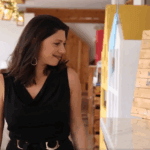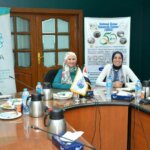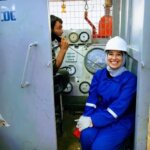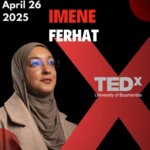Impact Stories from Environmental Sustainability Policy Area

Fellow honored as a 2025 L’Oréal Woman of Worth
Fellow(s): Aseel Honein
Country: Lebanon
Cohort: 2013
Policy Area(s): Empowering Women and Girls, Entrepreneurship, Environmental Sustainability, Professional Development
Fellow Aseel Honein (Lebanon, 2013) was recently recognized as one of L’Oréal’s Women of Worth 2025, receiving the Sustainable Architecture & Innovation Award, celebrated at a gala dinner on June 26 at Sursock Palace Gardens in Beirut, Lebanon.
Aseel is honored for her commitment to reimagining architecture as a tool for both sustainability and social impact. In a video featured at the event, she reflected: “I forged my own path, step by step. I transformed obstacles into opportunities, and barriers into bridges.”
Aseel is the founder of Indigo Kousba, a rural eco-tourism retreat in North Lebanon, and Parallel Studio, a design and technology academy focused on empowering youth through hands-on programs in architecture, design thinking and social innovation. Through Parallel Studio, she also created Architecture in a Box, a program that introduces children and teenagers to architecture, urbanism and cultural heritage through interactive learning and games.
“Guided by the same passion,” she shared, “I launched Architecture in a Box, a modest initiative in scale, yet monumental in impact.”
Report Date...: 07/14/2025

Fellow returns to UNEP as a Change Maker
Fellow(s): Ayeni Olamide
Country: Nigeria
Cohort: 2017
Policy Area(s): Entrepreneurship, Environmental Sustainability, Professional Development
Fellow Ayeni Olamide (Nigeria, 2017), founder of circular economy company HOPCYKU, was recently invited to the North America Office of the United Nations Environment Program (UNEP) in Washington, D.C., as a recognized Change Maker in sustainability. The invitation followed her participation as a panelist at the 2025 WWF Plastic Summit, where she spoke alongside policymakers, academics and global sustainability leaders.
Ayeni’s journey with UNEP began in 2019, when she was awarded a fellowship to attend the 79th UNEP/UNESCO/BMU International Short Course on Resource Efficiency, Circular Economy, and Waste Management in Dresden, Germany—her first formal education in environmental sustainability.
Reflecting on the milestone, Ayeni shared, “Visiting the UNEP Office was a full-circle moment. I got to share our journey, how we started, what we’ve achieved and where we’re headed.”
Report Date...: 05/05/2025

Fellow & Mentors publish international research paper
Fellow(s): Raushan Nurdillayeva
Country: Kazakhstan
Cohort: 2020-2021
Policy Area(s): Entrepreneurship, Environmental Sustainability
Fellow Raushan Nurdillayeva (Kazakhstan, 2020–2021) and LBNL mentors Virginia Altoe and Carolin Sutter-Fella have co-authored a recently-published materials science paper, “Humidity Disrupts Structural and Chiroptical Properties of Chiral 2D Perovskites”. Featured in the ACS Nano journal, the publication is the result of a global research collaboration spanning institutions in the U.S., Kazakhstan, and Europe—including the Molecular Foundry at Lawrence Berkeley National Laboratory (LBNL), where Raushan completed her TechWomen professional mentorship.
The study explores the effects of humidity on a promising class of materials known as chiral 2D perovskites, which have potential applications in advanced electronics such as spintronics. Their cross-border collaboration included researchers from Akhmet Yassawi University, the University of Nevada, Las Vegas and Eindhoven University of Technology.
Raushan’s participation was supported by the Bolashak “Internship for 500 Scholars” initiative under Kazakhstan’s Ministry of Science and Higher Education.
Report Date...: 05/05/2025

Fellow Forges New Collaboration Linking Water Research to Community Impact
Fellow(s): Marwa Ali
Country: Egypt
Cohort: 2024
Policy Area(s): Economic Impact, Environmental Sustainability, Professional Development
Fellow Marwa Ali (Egypt, 2024), director of International Sponsored Projects at Egypt’s National Water Research Center (NWRC), was instrumental in the recent signing of a formal protocol between NWRC and BENAA Foundation—marking a pivotal step in connecting scientific research to community-centered development efforts. BENAA Foundation is a youth-led non-profit organization focused on capacity building to enable and advance the realization of sustainable development projects in the MENA region.
This milestone marks a pivotal step in applying water research to real-world sustainability efforts, as NWRC celebrates its 50th anniversary. In her role as project leader, Marwa emphasized the importance of connecting knowledge to impact. “This is not just a collaboration—it’s the beginning of a meaningful path where water research directly supports people and sustainable development.”
Report Date...: 04/28/2025
Fellow-founded Green Watech featured by Africa’s Business Heroes and MEDI1TV for eco-friendly water filtration system
Fellow(s): Salma Bougarrani
Country: Morocco
Cohort: 2020-2021
Policy Area(s): Economic Impact, Entrepreneurship, Environmental Sustainability, Professional Development
Fellow Salma Bougarrani (Morocco, 2020–2021), co-founder and CEO of Green Watech, was recently spotlighted in a video produced by Africa’s Business Heroes (ABH) as well as in an interview by MEDI1TV Africa for her groundbreaking sustainable water purification system. Since delivering her winning pitch at the ABH semifinals in Cairo last September, Salma’s Green Watech has gained increased funding, visibility and access to a global network of support.
Her company’s low-tech, solar-powered filtration system—FISO—treats wastewater for reuse in agricultural irrigation, offering a clean, cost-effective and decentralized solution for remote areas. Built from locally sourced filtration bricks and designed to last up to 20 years, the system has already treated more than 400 million liters of wastewater, enabling the production of over 80,000 tons of food in water-scarce Moroccan communities.
“Innovation can be born where we least expect it” Salma shared in her MEDI1TV interview, where she reflected on her mission as a Moroccan scientist, entrepreneur and mother: She emphasized the power of accessible technology to improve lives in underserved areas—and the importance of purpose-driven leadership.
“This is the future,” she said, closing her winning ABH pitch. “Without water, we cannot survive. I am a mother and I don’t want my children to feel that they need to immigrate one day because of water scarcity or food insecurity.”
Watch Here
Read More »Report Date...: 05/12/2025

Fellow presents on public admin digitalization for SDGs
Fellow(s): Mahinabonu Bekova
Country: Tajikistan
Cohort: 2023
Policy Area(s): Empowering Women and Girls, Environmental Sustainability, Professional Development, Youth Engagement
Fellow Mahinabonu Bekova (Tajikistan, 2023) recently gave a presentation, “Transformation of Public Administration through Digitalization: New Opportunities to Achieve the Sustainable Development Goals (SDGs),” at Tajik National University. Her talk sparked engaging dialogue with students and faculty about how digital tools are reshaping public management. “It was very interesting to hear the opinions of future specialists and colleagues,” she shared, “on how digital technologies are opening up new horizons for sustainable development.”
The presentation followed Mahinabonu’s recent participation in the ERASMUS+ ESGCA project at the Slovak University of Technology in Bratislava, where she took part in a week of collaborative learning on ESG principles and sustainability. Highlights included site visits to the Slovnaft Refinery and sessions on water treatment innovation and university–industry partnerships.
She also recently served as a Technovation Girls mentor alongside fellow Zevar Davlatmamadova Bordachyova, for team Sigma Girls. Their team won first place in Tajikistan’s national competition for developing a mobile application that offers practical tools to help users navigate emergency situations.
Report Date...: 06/02/2025

Fellow featured in award-winning geoscience documentary
Fellow(s): Sara Fakhry Elokda
Country: Egypt
Cohort: 2022
Policy Area(s): Empowering Women and Girls, Environmental Sustainability, Professional Development
Fellow Sara Fakhry Elokda (Egypt, 2022) was recently featured in the award-winning film “Abia” (“أبية”), a documentary highlighting her path as a well-site geologist and her work advancing renewable energy in Egypt and beyond. The film premiered on the banks of the Nile during the Aswan International Women Film Festival and went on to win Best Impact Film at the festival.
The title Abia, meaning strong-willed in Arabic, reflects Sara’s determination to break barriers in a traditionally male-dominated field. “This isn’t just a personal win or a film about me,” she said. “It is a moment of recognition for every woman in geoscience who’s working hard.”
Sara’s story is not only one of personal resilience but of scientific impact. She was recently awarded the Excellence Award at the SEG IMAGE Conference in Houston for her team’s work on carbon capture in Norway and was recognized as a global finalist in the EAGE Laurie Dake Challenge for her geothermal energy research in the Vienna Basin.
These innovations, developed with her team at Helwan University, are now part of her vision for energy transformation in the MENA region. “I hope the film reaches and encourages young women who feel that their dreams are too bold,” she shared. “Because sometimes, being ‘too much’ is exactly what the world needs.”
Report Date...: 06/02/2025

Fellow named runner-up in Cambridge Zero Climate Challenge
Fellow(s): Sally Musonye
Country: Kenya
Cohort: 2023
Policy Area(s): Entrepreneurship, Environmental Sustainability, Professional Development, Youth Engagement
Fellow Sally Musonye (Kenya, 2023), founder of AshGold Africa Initiative, was recently recognized as a runner-up in the 2025 Cambridge Zero Climate Challenge. Sally, a Commonwealth Master’s Scholar at the University of Cambridge, collaborated with fellow scholar Kamalha Jockim to pitch a social enterprise addressing energy poverty and educational inequity in rural Kenya.
AshGold Africa Initiative, launched in 2015, focuses on creating sustainable impact through solar energy and mentorship programs. To date, the initiative has mentored more than 11,000 students and educators in 13 schools, trained 20 solar technicians, and completed two solar installations displacing over 3 tons of CO₂ emissions.
Through five weeks of training, Sally and her team refined a scalable model to accelerate climate resilience, drawing on expertise in climate entrepreneurship, voluntary carbon markets and sustainable development.
In a recent blog post, Sally expressed that “the path behind us is lined with lessons, quiet triumphs and progress; beyond the horizon lies a future of promise and possibility.”
Report Date...: 06/09/2025

Fellow gives TEDx talk on resilient innovation at University of Bourmedes in Algeria
Fellow(s): Imene Ferhat
Country: Algeria
Cohort: 2022
Policy Area(s): Economic Impact, Environmental Sustainability, Professional Development
On April 26, Fellow Imene Ferhat (Algeria, 2016) took the TEDx stage at the University of Boumerdes in Algeria to share her personal and professional journey in a powerful talk titled “The Resilient Innovator: From Playing It Safe to Breaking New Ground.” Drawing from more than a decade in the energy sector, Imene spoke candidly about stepping out of her comfort zone, transitioning from engineering into business leadership, and the mindset shifts that shaped her growth.
In her talk, Imene challenged the audience to rethink their relationship with time—arguing that effective time management isn’t about discipline alone, but about deeply understanding one’s purpose and making every decision count. She reflected on the courage it takes to evolve from being “a simple engineer” to a strategic leader, especially in male-dominated industries.
“Some people say they started from zero, but their zero was really a million,” she explained in a post-talk interview. “My zero was worth negative 100.”
Now serving as North Africa Business Development Manager at GOWell International, Imene blends technical expertise in geomechanics with business strategy to drive innovation and cross-industry collaboration. Her academic path—from PhD to MBA—underscores her belief in lifelong learning as a vehicle for transformation.
Report Date...: 06/09/2025

Fellow(s): 21 TechWomen mentors and fellows organize impact trip to Lebanon to implement international collaboration in STEM
Country: Lebanon, United States
Cohort: 2014, 2017, 2022, 2023, 2024
Policy Area(s): Economic Impact, Education Diplomacy/Mentoring, Empowering Women and Girls, Entrepreneurship, Environmental Sustainability, Professional Development
TechWomen mentors and fellows organize impact trip to Lebanon to implement international collaboration in STEM
From May 31 to April 8, 2025, TechWomen mentors from Silicon Valley journeyed to Beirut for a powerful week of knowledge exchange, mentorship, and community building led by Lebanese TechWomen fellows who co-organized a series of high-impact events. U.S. mentors Jill Finlayson, Kathy Giori, Rekha Pai, and Terri Khonsari joined Lebanese fellows Aseel Honein (2013), Christelle Bou Harb (2024), Claudette El Hajj (2022), Diala Al Samarani (2022), Ghiwa Haddad (2022), Hala Awkar (2024), Lara Chikhani (2017), Lara El Khoury (2014), Nisrine Bou Ghannam (2024), Noura Al Merhabi (2024), Rola El Hafi (2022), Sabine El Kahi (2014), Sawsan AlJamal (2023), Sawsan Sleiman (2024), Talar Kichian (2023), Zahraa Sweidan (2024) and Zeina Farah (2022) in orchestrating this impactful series of events that brought together a variety of institutions, students, entrepreneurs and local changemakers in an inspiring journey to advance international and local innovation, mentorship and STEM excellence.
Highlights included a high-level AI and Entrepreneurship forum at the American University of Beirut, featuring guests from the U.S. Embassy of Lebanon and speakers from the National Center for Entrepreneurship and Innovation (NCEI). Another standout event was hosted at Lebanese American University (LAU) in partnership with the LAU Innovation Center, where mentors met with computer science students and faculty to explore the intersection of entrepreneurship, startups, and global collaboration. Additionally, a panel titled “AI Tools: Accessibility, Ethical Use, and Impact was organized in collaboration with LAU Libraries, Arab Union for Specialized Women, and others. At Beirut Digital District, the event “Connect & Elevate: Lebanese Women” welcomed leaders in STEM from across the country for an evening of community networking and mentorship with the visiting U.S. STEM pioneers. These mentors also met with entrepreneurs at the Chamber of Commerce in Tripoli (Lebanon) and delivered sessions at Lebanese University Roumieh, supported by partners such as IEEE Lebanon Joint Chapter, EdTech Syndicate in Lebanon, and the Chamber of Commerce, Industry and Agriculture of Beirut and Mount Lebanon. Mentors also brought their STEM expertise and leadership to youth, delivering inspiration and hands-on physical computing workshops to students at the American High School in Lebanon, girl scouts from the AGBU – AYA Antranik Antelias Scouts, and more.
“Let’s keep bridging global wisdom with local talent,” reflected fellow Zahraa Sweidan on the powerful week of events.
Read More »Report Date...: 04/07/2025

